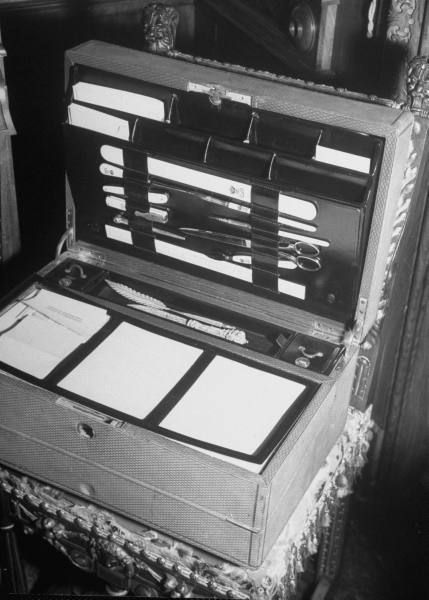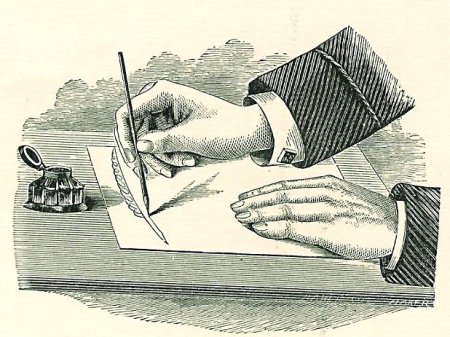
Editor’s Note: This is a guest post from Harry R. Burger. Mr. Burger wrote his first letter to his congressman over ten years ago, and once had his state assemblyman recognize him by name from the back of a crowd.
Politics is a time honored manly pursuit. If a man doesn’t stand up for his own interests, how can he rightly expect anyone else to? While actually running for office may be a goal for some, it behooves all citizens to at least be aware of the politics and current events of their community, nation, and world. When you come across an issue you feel strongly about, instead of yelling at the television, you can actually do something about it–write your Congressman.
“Why should my Congressman care what I think?” you may ask. Well, you are one of their constituents–that makes it their job to represent you in government. They work for you, and if they don’t do their job and satisfy the people they represent, they can get voted out of office in the next election.
The First Amendment to the US Constitution guarantees the right of all citizens to communicate with their elected representatives:
Congress shall make no law respecting an establishment of religion, or prohibiting the free exercise thereof; or abridging the freedom of speech, or of the press; or the right of the people peaceably to assemble, and to petition the Government for a redress of grievances. (emphasis added)
This is a right Americans are fortunate to have–and don’t exercise nearly enough. Many men feel cynical and apathetic, that politicians are so corrupt that it’s not worth their time to petition them. But that just turns into a self-fulfilling prophecy! Things will never change if good men don’t get involved and hold their politicians accountable. Writing your representatives may seem like only a small thing, but politicians need to know that their constituents are paying attention.
Writing to your Congressman, or any other elected official, isn’t as hard or time-consuming as you might imagine. Follow the guidelines outlined below, exercise your citizenship, and make your voice heard.
Before You Write Your Representative
1. Hone in on exactly why you are writing.
Do you have a strong opinion on an issue you heard about in the news? Do you feel you have been treated unfairly by an agency of the government? Do you have a problem you believe deserves to be addressed by a new law? Does a particular law seem unfair to you, or to have undesirable implications? Are you applying to a service academy (i.e. West Point)? Are you working on the Citizenship in the Nation Merit Badge for the Boy Scouts? Are you making a courtesy invitation? Do you really like something your representative did?
It is important to sum up your purpose in one sentence, and not the kind with six commas. This is the first step, and it is important to give you focus and inform the rest of the process. Under most circumstances, this will be the first line of your letter.
2. Figure out whom you should be addressing.
You need to make sure you are sending your message to the right person. This can sometimes take a little bit of homework, depending on your issue. Sometimes your senator or representative is not the best person to handle your issue. For example, if you are concerned with land zoning, this is probably best addressed to your town or county level officials, and issues of state law go to your state legislator. Usually, it is best to deal with someone as low as possible in the chain that can help you, so you don’t need to wait as your message is passed down through the chain. The fewer constituents an official has, the more personal attention they can afford to give your message.
Every jurisdiction is structured differently, so it is impossible to summarize how to figure this out here. The internet has made this much easier, as almost every government branch and agency has a website these days. For federal representatives, www.govtrack.us has an interactive map setup to help you figure out what district you are in. Often, your local chapter of the League of Women Voters will maintain and publish a list of government officials, or a local library should be able to help.
“Do not ask for something they cannot deliver. A Town Supervisor, for example, cannot lower school taxes or increase Social Security Benefits.” -Frank Petrone, Supervisor, Town of Huntington, NY
You almost always want to address someone who represents you directly. If you get to vote for them they will care more about what you think, and if you accidentally address the wrong legislator they might be obligated to ignore your request out of courtesy for your actual representative. One exception to this might be if the issue affects a location that’s close to your home but technically in a different district–then your best bet is to address your concern to both representatives, and tell them both that you are doing so.
3. Pick the appropriate medium for your message.
Almost all public officials have a website these days–just Google their name and then look for the “Contact” link on their page. They may have specific instructions on how they prefer to be contacted. For example, in the wake of the 9/11 attacks and anthrax mailings, members of Congress asked for emails instead of letters because of the extra security screenings and delays associated with physical mail. In general, you should choose the medium according to the issue you want addressed and how strongly you feel about it.
• Hard copy: This is the most dignified and time honored method. There is something about committing a message to paper that makes it all the more official and concrete. Generally this is your best route if you have the time to do it right, and you want to be taken seriously.
Only handwrite the final copy if you have nice, legible penmanship. Handwriting adds a more personal touch, but if the person on the other end can’t read what you want, then what’s the point of writing at all? If yours isn’t very good, perhaps it is time to start a journal for practice.
• Email: Best for when time is not particularly urgent and you don’t care all that strongly about an issue, but you still want your voice heard. Please do still follow the other guidelines here–it is far too easy to fire off an email in the heat of anger and without proofreading, which could hurt your case if the reader associates your point of view with characteristics like “uninformed” or “uneducated” or “irrational.”
You may come across a cause asking you to write in using a pre-written form letter where you only have to fill in your address and signature. While this is better than doing nothing to support the cause, it makes you just one more number; their staff will say “we got 25 letters or emails supporting XYZ.” It’s a little better if you can add a personal notation in the space usually provided, but if you really want to make an impact, it is always best to write your own message from top to bottom. You can copy out ideas or statistics or such from the form letter, but try to paraphrase and make it more personal.
• Phone call: If you hear on the news that something is being voted on today or tomorrow and you can get a live person from their office on the horn, this is the way to make sure your message gets through before it is too late. Keep it short and factual and be very clear on what your position is. If it’s not that urgent, it’s better to use another avenue.
• Meeting in person: This one has a lot of variability. There may be a public hearing for a specific issue, they might hold an event specifically to meet constituents and/or fundraise, or they may attend a meeting of civic groups like a Chamber of Commerce. My state assemblyman is known for showing up personally at Eagle Scout Courts of Honor, for example.
Usually you will not have very much time to address them, as there are many others like you waiting to do the same. Know what you want to say before you stand up to the microphone or shake their hand.
One strategy is to send a letter beforehand and at the meeting introduce yourself and refer to the main points of your letter. This lets them put a face to a name and shows that you care enough to participate in politics on multiple fronts.
Writing the Letter
1. Open the letter with an appropriate salutation. For a Representative or Senator, “To the Honorable John Doe,” is a good way to go. Using a title here is also acceptable, “Dear Supervisor Petrone,” for example. Also, make sure your full name and address is on the letter itself–envelopes can get lost, and you need to be sure they can verify if you are a constituent or not and send you a response. This is still important if you are sending an email. All the normal standards of good letter writing apply. Good stationery can’t hurt either.
“Keep it short.” -NY State Assemblyman Jim Conte
2. Get straight to the point. The first line of the letter should summarize why you are writing and what it is that you want (you should already be clear on this if you followed the above guidelines). Options include, “Thank you for…” “I support the passage of…” “Bill XYZ should not be allowed to pass,” etc. If it’s about a specific bill, include its official name and number if possible (ex. “USA PATRIOT Act HR 3162”). Don’t ramble on too long–people tend to get bored and stop reading after a page or two unless you write something interesting enough to justify it. And if you ramble, it makes you seem like a crazy man.
3. Back up your concerns. Hard facts and statistics cited from a specific, published source (be sure to say where you get the information from) can support your position much better than nebulous statements and pure opinion. Personal stories are often appropriate. If you can tell a story of how this issue affects you or your family specifically, that helps to “bring it home.” Politicians love to be able to call out their constituents by name and put a face on the cause. This also helps to develop a more personal connection between you and your representative.
4. Always remember to be respectful. This is someone of power and influence you are addressing, and generally you are looking for them to do you a favor. Impugning your recipient’s character or honesty is counterproductive. Above all, do NOT include anything that could be construed as a threat, unless you enjoy the prospect of the FBI investigating you.
Receiving a Response
Members of Congress are entitled to franking privileges, which means that their signature in place of a stamp lets them send mail to their constituents for free. Other officials may not be so lucky, but it is still in their best interest to let you know what they are doing to help you out–after all, they want your vote, and you’ve already shown them you care more about politics than most.
You may or may not receive a response, depending on the person you address, the issue you discuss, how many people wrote in about that issue, how busy the office is with other mail, how busy the official is at the moment, and other factors too varied to count. The bottom line is that if you don’t get an answer, it may not be any fault of yours. It might even just be delayed–Vice President Dick Cheney’s office once took almost three years to decline a courtesy invitation to my Eagle Scout ceremony (they blamed it on post-9/11 mail security). If getting a response is important to you, ask for one specifically.
More likely than not, any response you do get will be some sort of a form letter. Keep in mind when you are reading their response that this person most likely got to their office at least in part because they are gifted wordsmiths and diplomats, which is to say, you’ll need to read between the lines. If they can honestly say, “I agree with you and I voted accordingly,” of course they will do so. Flowery talk about taking your views into consideration or such without an explicit “I voted this way,” means they voted the other way, and they know you won’t like it, but they are trying to make it sound like they are still on your side.
If they do something special to help you out, a thank you note to let them know that your issue has been resolved is a respectful courtesy.
Like any activity, writing effective letters is a skill that improves with practice, and the first time is the hardest. Do yourself a favor and get over that hump today. Find an issue that matters to you–even if your passion for it isn’t very strong–and let your elected official know how you feel. It’s good practice for when you do have an important cause to champion.
Tags: Writing






